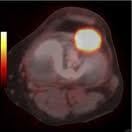
April 7, 2010 - The American College of Radiology Imaging Network (ACRIN) has officially launched a new clinical study on FDG-PET/CT for the head and neck led by Val Lowe, M.D., professor of radiology, Division of Nuclear Medicine, at Mayo Clinic, Rochester, Minn.
“A Multicenter Trial of FDG-PET/CT Staging of Head and Neck Cancer and its Impact on the N0 Neck Surgical Treatment in Head and Neck Cancer Patient” (ACRIN 6685) will involve up to 15 participating sites, which are expected to accrue 292 study participants in approximately two years.
The primary objective of trial is to determine the predictive value of FDG-PET/CT for staging the clinically-defined negative neck (N0 neck) based upon pathological sampling of the neck lymph nodes. Researchers will also try to determine the potential of FDG-PET/CT to change treatment of the N0 neck patient.
Participants with newly diagnosed head and neck squamous cell carcinoma will undergo a FDG-PET/CT scan prior to surgical resection. The surgeon will have access to the FDG-PET/CT results prior to the surgical procedure. The data will demonstrate how the inclusion of the FDG-PET/CT imaging will affect the determination of extent of disease, disease characterization and prognosis, and the surgical plan originally devised from clinical nodal assessment and CT or MRI results.
Quality of life assessments and cost effectiveness analysis will be included in the study to determine the impact of FDG-PET/CT inclusion relative to treatment of the N0 neck. Prior to imaging, blood samples will be collected to explore serum biomarkers as they correspond to prognosis, staging, and FDG-PET/CT findings. A correlation between FDG-PET/CT imaging and biomarker data in the same patient group would be useful for early disease detection and to decrease treatment costs.
Researchers expect to confirm that FDG-PET/CT images improve the characterization of the N0 neck by accurately diagnosing NO necks, better defining extent of primary disease, discovering unappreciated distant metastasis, reducing morbidity, and representing value to society.
For more information: www.acrin.org/6685_protocol.aspx
